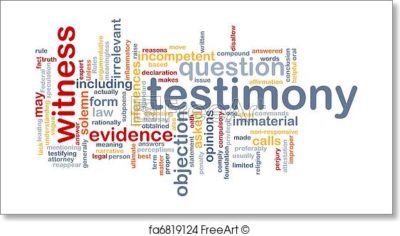The big political show in the past few weeks, barring something unforeseen happening, were the House Judiciary and House Permanent Select Committee on Intelligence hearings with Special Counsel Robert Mueller III. I will leave it to others to go through his testimony line by line or to opine on what his testimony before these committees means for the President, for the 2020 Democratic presidential primary, the 2020 presidential elections, and the US. Rather, I want to use The July 24 hearings to think about how to think about senior leader, other subject matter expert’s, and other’s public testimony so you don’t have to just rely on the clips picked for maximum effect on whichever news channel, digital or traditional print newspaper, or social media feed you get your news from. We’re going meta!

Special Counsel Mueller’s testimony before both congressional committees was both based on and stayed very close to the report that his office prepared when it concluded its investigation into both Russian interference in the 2016 US election and what, if any, connections existed between the President’s campaign and the Russian efforts to tilt the election in his favor. This provides the obvious place to start to prepare for Mueller’s testimony: the report his office produced.
I recognize that not everyone has the time to read a 400 page report that overlaps the areas of criminal and counterintelligence investigations. And while there is a free audiobook, a good place to start for a focused summary is Quinta Jurecic’s heatmap of the Mueller Report at Lawfare. I also recommend Benjamin Wittes’s, who is Lawfare’s editor in chief, notes on the report, which provides an easy to follow summary.
I also know that not everyone has five or six hours to sit around and watch the Special Counsel testify. Fortunately, C-Span archives the testimony for when you have the time and the interest in actually seeing what was asked and how the Special Counsel answered the questions. The House Judiciary testimony can be found here. And the House Permanent Select Committee on Intelligence Testimony can be found here. C-Span also provides full transcripts below the video indexed by time for your convenience.
If an opening statement has been submitted in advance, it also makes sense to have those close at hand as they tend to frame the witness’s testimony. Mueller’s opening statements can be found here and here.
Day in and day out, week in and week out, most of us don’t have the time, the interest, or the reason to actually watch people – from appointed and career senior leaders to other senior civil servants to subject matter experts to, in some cases, just everyday Americans – testify before Congress. At the same time, these congressional investigations can be vital for actually understanding what is going on within the Federal government in the US. Think of them as the Federal version of county commission on city council meetings. As such, and despite the all too often spectacle around hearings on high profile issues and events, the information presented is often necessary for us to think critically about major issues facing America and Americans. Being able to either do a small amount of preparation before watching a hearing or before reading the transcript when one has the chance, is an important immunization against the attempts to weaponize the information elicited in the hearings to simply score partisan political points.
I guarantee that as I am writing this week’s column, decisions are being made at different news networks, newspapers, talk radio, and by people curating social media feeds of news, that will present both what Special Counsel Mueller was asked and how he answered in very different ways. Some of these differences will just be normal editorial differences. Others will be intentionally made for specific partisan purposes. And this is just the informational framing being done by Americans. As we have focused on in previous columns, there are a large number of producers of news, or of information packaged as news, for our consumption and not all of them are honest brokers or have America’s and American’s best interests at heart. Being able to self prepare and think critically about the information produced from Wednesday’s two hearings with Special Counsel Mueller, or any other congressional hearing, is a key component in thinking security.








Recent Comments